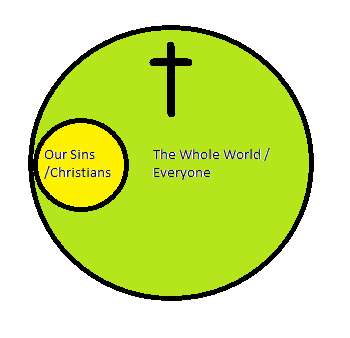
Not all Lutherans agree on the doctrine of Objective Justification. A notable dissenting synod would be the Evangelical Lutheran Diocese of North America (ELDONA). The discerning reader should look at their arguments too.
Simply stated in my own words, the doctrine teaches that Jesus died for everyone and paid for the sins of everyone, even for the people who will be in hell for all eternity. Below is the wording put out by the LCMS.
“By “objective” or “universal” justification one means that God has declared the whole world to be righteous for Christ’s sake and that righteousness has thus been procured for all people. It is objective because this was God’s unilateral act prior to and in no way dependent upon man’s response to it, and universal because all human beings are embraced by this verdict. God has acquired the forgiveness of sins for all people by declaring that the world for Christ’s sake has been forgiven. The acquiring of forgiveness is the pronouncement of forgiveness.” – CTCR Report Study Theses on Justification #23
I’ve assembled some rather standard proof texts for this. These are not all of the passages used in the CTCR but rather are the ones that I found convincing. Below you will see that passages that I understand as clearly including either everyone in a broad sense or unbelievers in a narrow one.
“‘My little children, I am writing these things to you so that you may not sin. But if anyone does sin, we have an advocate with the Father, Jesus Christ the righteous. He is the propitiation for our sins, and not for ours only but also for the sins of the whole world.” 1 John 2:1-2 ESV
‘Therefore, as one trespass led to condemnation for all men, so one act of righteousness leads to justification and life for all men. ‘ Rom 5:18 ESV
“He has no need, like those high priests, to offer sacrifices daily, first for his own sins and then for those of the people, since he did this once for all when he offered up himself.” Heb 7:27 ESV
Some I’ve read will try to take the passages teaching gratia universalis and argue that they are speaking to all of a narrow category. So all of some if that helps. The reason I chose those listed above is because they juxtapose two groups against each other as I think this approach steps around those arguments. The easiest one being 1 John 2:1-2 which I will post again:
“My little children, I am writing these things to you so that you may not sin. But if anyone does sin, we have an advocate with the Father, Jesus Christ the righteous. He is the propitiation for our sins, and not for ours only but also for the sins of the whole world.” 1 John 2:1-2 ESV
The apostle John was certainly a believer, so when he says Jesus is the propitiation for “our” sins he would most logically be meaning himself and the other believers he is writing to. Then when he wraps in the sins of the whole world in opposition to “our” the plainest rendering is that he is juxtaposing non-believers against believers. For him to be juxtaposing believers against believers would be repetitive at best.

I would use similar argumentation for the other passages presented. In context and at their plainest meaning Christ died for all. To me, to read passages like this another way smacks of the hand stands and back flips I remember SDA doing on passages like Col 2:16.
Here is the problem some like to present though, if Christ died for all does it not also follow that nobody is going to hell? Does this mean you have to be a universalist? Read this passage one more time, I’ve highlighted a different section in verse 6.
Notice above that God desires all to be saved and has given himself as a ransom for all. It would not be logical to assume that Paul was flipping categories in this one line of thought. The same all in verse 4 is the same all in verse 6. However we see in other passages that some people do go to hell.
“Then he will say to those on his left, ‘Depart from me, you cursed, into the eternal fire prepared for the devil and his angels. ….’ And these will go away into eternal punishment, but the righteous into eternal life.” Matthew 25:41-46 ESV
The debt has been paid for all, no blood was spared on the cross. The manner in which we receive this gift is where I would draw the distinction, not in who it was shed for. Man receives faith as a gift via means of grace.
Regarding means of grace, below are a few posts I have written that I believe lay out that claim Biblically, I don’t want to re-do the work here. Be advised that each of these rely on posts that precede them so if these are all new concepts for you then be prepared for a long study that took me years to work out.
| Grace |
Final Thoughts
I agree with Objective Justification because I think it’s the plainest way of understanding all of these texts. God has paid the price for everyone. A full pardon exists for everyone even though God knew full and well before he created anyone who will receive it and who would not. We receive that pardon by grace through means.
Why? I don’t care I just want to believe what’s true….
What does this change? This isn’t just a thought doctrine, it changes the kinds of words you’re comfortable using or not comfortable with. For example, I would have no problem saying “Christ died for everyone” or that he “paid it all”. I would not agree with the notion that he only died for the elect. I simply distinguish between sin being paid for and forgiveness being received. All sin was paid for on the cross, and forgiveness is received in word and sacrament.

The issue with objective justification is that Christ obtained forgiveness of sins and justification, for all those that would come to believe in HIm. Christ died for all does not mean that he paid for the sins of all men, including those that will be lost in hell through unbelief. Certainly the price paid by God is sufficient to redeem many more people than those that will actually come to faith, his precious blood is of infinite value, however the intent of Christ when he died on the cross was solely to redeem those that would come to believe in HIm, and at the cross he did save those sinners that would repent and believe only. God does not desire all men to be saved, instead the scripture teaches he desires all men to be saved and to come to the knowledge of the truth, God does not desire and does not intend to save any man that does not come to the knowledge of the truth. Revelation 5:9 is clear that God has redeemed people from every nation and tribe, but he has not redeemed all people from every nation and tribe, only those that will come to faith in Jesus. Jesus was not a universalist, he came to save his people from their sin, and he actually did save them at Calvary. No unbeliever and no man that would never come to put his trust in Jesus was saved at the cross when Christ died for the sins of his people. The gospel is offered to all. but telling people that Chirst has paid everybody’s sins (including those that go to hell) and they are now righteous in God’s eyes is not the gospel, and it will fail to create saving faith.
LikeLike
With respect, I interpret all as meaning all just like I interpret day in genesis as meaning day, and the word is in Matt 26:26 as meaning is.
Lutherans like myself are pretty annoying about that. We refuse to bend the text to sophistry.
LikeLike